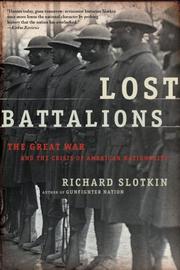
Lost Battalions
By Richard Slotkin
Subjects: Ethnic relations, World War, 1914-1918, Minorities, United states, army, regimental histories, African American troops, World war, 1914-1918, united states, United states, ethnic relations, United states, army, african american troops, Minorities, united states, Recruiting, enlistment, United States. Army. Infantry Regiment, 369th, United States, World war, 1914-1918, regimental histories, United states, army, infantry, World war, 1914-1918, african americans, Regimental histories, United states, army, recruiting, enlistment, etc., United States. Army, African american soldiers, United states, army, history, African American Participation, History, African American soldiers, African-American soldiers
Description: Constructed as a military history of two American army regiments of World War I, Slotkin's narrative functions as an inquiry into the soldiers'racial and ethnic backgrounds. Both units were raised in New York City: one consisted of black soldiers, the other of recent immigrants. That description only begins the contextual social spectrum Slotkin covers in arguing his thesis: that white racial conceptions of Americanism after the war thwarted the expectations of blacks and Jews. Slotkin defines those hopes as a "social bargain" implicit in the support given to black recruitment by leaders such as W. E. B. DuBois: if we enlist, then after victory, you will abolish Jim Crow. The bargain's fate unfolds as Slotkin recounts the racial relations with the two regiments (often relating tension between named individuals) in the course of training and ferocious combat in France. The bargain's unraveling in the race riots of 1919, followed by the melancholy fates of some returning veterans, concludes Slotkin's scholarly analytic history.
Comments
You must log in to leave comments.